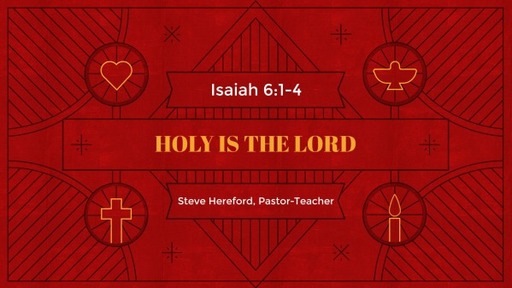Holy is the Lord

What does it mean that God is "Holy, Holy, Holy"? How does this effect the church and world today? Is the church proclaiming God's holiness or basking in her sinfulness? Join Pastor Steve as he examines Isaiah 6:1-4.
In Egypt there have been found eagle-lion-shaped figures guarding a grave, to which is applied the name seref.
Seraphim are in Jewish theology connected with cherubim and ophanim as the three highest orders of attendants on Yahweh, and are superior to the angels who are messengers sent on various errands.
Elsewhere in the OT the word “seraph” refers to poisonous snakes (Num 21:6; Deut 8:15; Isa 14:29; 30:6). Perhaps they were called “burning ones” because of their appearance or the effect of their venomous bites, which would cause a victim to burn up with fever. It is possible that the seraphs seen by Isaiah were at least partially serpentine in appearance. Though it might seem strange for a snake-like creature to have wings, two of the texts where “seraphs” are snakes describe them as “flying” (Isa 14:29; 30:6), perhaps referring to their darting movements.
the word used in connection with the sin offerings and judgment. Apparently the seraphim are in contrast to the cherubim. The seraphim search out sin, and the cherubim protect the holiness of God.
Representations of angelic creatures with six wings have been discovered in the Near East by archaeologists.
In Ezek 1, the cherubim fly with two wings and cover their bodies with the other two. The seraphim cover their bodies with four wings and fly with two.
By the feet the Hebrews mean all the lower parts of the body. But the people of the East generally wearing long robes, reaching to the ground, and covering the lower parts of the body down to the feet, it may hence have been thought want of respect and decency to appear in public and on solemn occasions with even the feet themselves uncovered.
The difficulties involved in defining holiness are vast. There is so much to holiness and it is so foreign to us that the task seems almost impossible. There is a very real sense in which the word holy is a foreign word. But even when we run up against foreign words there is always the hope that a foreign language dictionary can rescue us by providing a clear translation. The problem we face, however, is that the word holy is foreign to all languages. No dictionary is adequate to the task.
Our problem with definition is made more difficult by the fact that in the Bible the word holy is used in more than one way. There is a sense in which the Bible uses holy in a way that is very closely related to God’s goodness. It has been customary to define holy as “purity, free from every stain, wholly perfect and immaculate in every detail.”
Purity is the first word most of us think of when we hear the word holy. To be sure, the Bible does use the word this way. But the idea of purity or of moral perfection is at best the secondary meaning of the term in the Bible.
When we use the word holy to describe God, we face another problem. We often describe God by compiling a list of qualities or characteristics that we call attributes. We say that God is a spirit, that He knows everything, that He is loving, just, merciful, gracious, and so on. The tendency is to add the idea of the holy to this long list of attributes as one attribute among many. But when the word holy is applied to God, it does not signify one single attribute. On the contrary, God is called holy in a general sense. The word is used as a synonym for his deity. That is, the word holy calls attention to all that God is. It reminds us that His love is holy love, his justice is holy justice, his mercy is holy mercy, his knowledge is holy knowledge, his spirit is holy spirit.
The shout of the seraphs shook the very foundations on which the thresholds of the gates of heaven rested
if inanimate and dumb creatures are moved, what ought we to do, who feel, smell, taste, and understand, for no other purpose than that we may obey his word in a holy and reverent manner?
If even the doorposts of the heavenly temple shook in response to God’s holiness, how much more will the whole earth (v. 3) shake when the Lord visits it (Matt. 24:29, 30)
sign of the presence of God, as in ch. 4:5; but more often it indicates his presence in anger or judgment (see Exod. 19:18; 20:18; Rev. 15:8).
